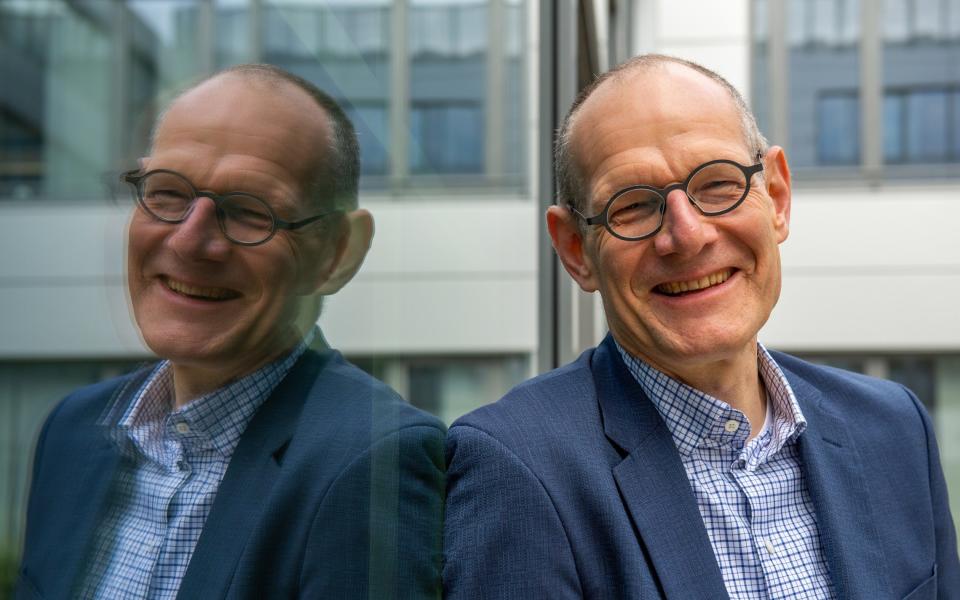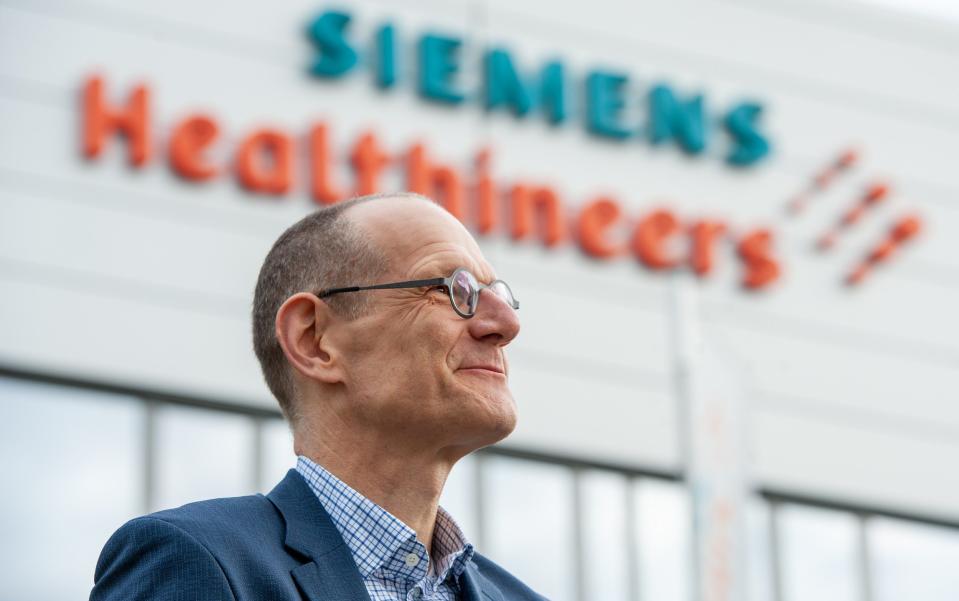Throwing cash at NHS won’t fix ‘hidden pandemic’, warns healthcare chief

By his own admission, Bernd Montag cuts an imposing figure.
“What one doesn't see on Zoom is I am relatively tall,” he says. “I'm a bit of a scary person,” adds the 6’9” former professional basketball player.
Siemens Healthineers, the company Montag leads now his days of shooting hoops are over, is a name that perhaps rolls off the tongue less comically in his native Germany than the UK.
As the eleventh-biggest company on the German stock exchange, Siemens Healthineers commands a stock market valuation of more than €50bn (£44bn), sitting one rung below chemical and pharmaceutical titan Bayer and a step above German carmaker BMW in the Deutsche Boerse rankings.
Part of Germany’s sprawling Siemens conglomerate for more than a century, Healthineers was spun off in 2018.
“[We are] the clear leader in medical imaging,” says Montag.
Siemens is credited with building the first X-ray tubes for medical diagnostics in 1896. It helped develop the first ultrasound technology in the 1950s. And later in the same decade, one of Siemen Healthineers predecessor firms then produced the first pacemaker.
Innovations that are commonplace in many hospitals followed: the first CT scanner came out in 1975, and the MRI in 1983. Today, the company claims nine out of every 10 hospitals worldwide use its products. It employs 3,000 people in the UK and Ireland, including in Oxford which is home to its global magnet factory for MRI scanners.

As one of Siemens Heathineers biggest clients, Montag is diplomatic when it comes to questions about the NHS, preferring to answer most questions conceptually rather than pinning the blame on the 74-year-old institution.
Liz Truss has made no secret of the NHS being one of her three priorities since taking over as Prime Minister. Few would argue that the fabled organisation is not sagging under the pressure of a Covid operation backlog and surging waiting lists.
Montag’s sentiment, however, is clear: simply throwing money at the NHS is not the answer to its woes.
“When you have a problem,” he says. “When you have more demand then you can fulfil… this is where innovation plays a role. This is when you invest into technology.”
If this all sounds like turkeys voting for Christmas, there is plenty of evidence that the NHS, Truss and her health secretary Therese Coffey should take note.
At the last count Britain spends 13pc of GDP on healthcare, more than every developed country aside from the US. Those advocating fiscal constraint say this shows the NHS should concentrate on spending wisely.
Although the number of GPs in England has fallen by 8pc since 2009, hospital doctor numbers have grown by a third. Meanwhile, the UK has invested far less in capital infrastructure than any other developed nation over the last decade, an analysis by the Health Foundation found in 2019.
The argument goes that the NHS has morphed into an organisation that treats sick people rather than preventing them getting ill in the first place.
Montag is too diplomatic to urge the NHS to embark on a scanner spending spree instead of hiring thousands of new nurses. Instead he says health authorities need to think about injecting “intelligence into the system”.
Officials must think about how to “diagnose early, instead of treating late and then [have to] throw people at it”. This, he adds, can manifest in a number of ways. It is not solely about buying more scanners instead of nurses. It is about how the MRI or CT machines are rostered, so that the technology can be fully utilised, for example.
Montag will this week underline these points at a healthcare conference in Hertfordshire. He will also give a more sinister warning. Britain, along with many other countries around the world, is facing a “hidden cancer pandemic”.

Cancer currently kills an estimated 10 million people every year, five times the number of Covid deaths.
And yet, as Montag points out, the world was paralysed by the pandemic as citizens were issued with restrictions on their liberty and urged to be vaccinated against the virus.
“Covid is horrible, [and] it caught everybody's attention,” Montag says. But, he asks, if cancer is more of an existential threat, why doesn’t it command similar fear in the minds of governments, health professionals and the public?
Cancer charity Macmillan has estimated that there are roughly 50,000 “missing diagnoses” in the UK. Meanwhile Cancer Research UK says delays to cancer screening and waits for further diagnostic tests and treatment are affecting around 2.4 million people.
The hidden pandemic is “something we better think about”, Montag says. “I could also argue [treating cancer] is more important [than Covid] in the long run, because cancer is here to stay.”
For all the beating the NHS gets, rectifying its problems could prove easier than the more fragmented public/private set-ups on the Continent that are regularly lauded.
No matter how disjointed the UK’s health system may appear, the Munich-born executive repeatedly insists that the NHS is a big “opportunity” for Siemens Healthineers.
Such rhetoric will strike fear into those on the Left of the political spectrum that the authority will move further into private markets with ever-closer relations with bastions of free enterprise, such as the one Montag leads.
The public versus private debate is redundant, he insists. “What is really important is to look at the mindset with which one looks at healthcare.”
“[It is about] how we use technology in order to take the waste out of the system. Using this mindset doesn't depend on whether something is public or private.”
Montag’s passion for technology and his company is hardly surprising given his background. He combined playing professional basketball in Germany’s top league with completing a PhD in theoretical multi-particle physics in the 1990s.
“That was a real passion,” the 53-year-old says of his academic work. “I like the beauty of simplicity.”
Making things more simple is precisely what the NHS needs a little more of.

 Yahoo Finance
Yahoo Finance 